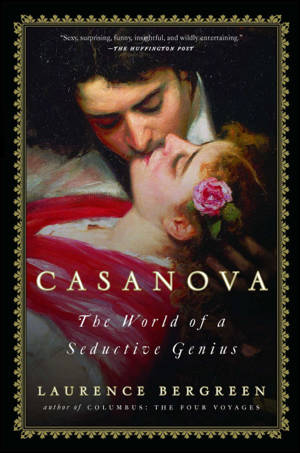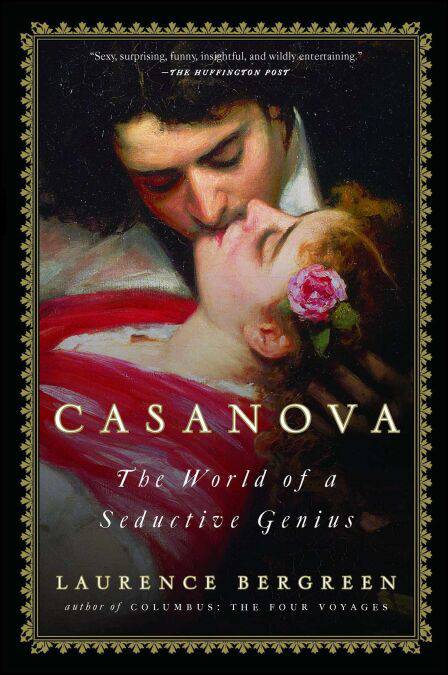
- Afhalen na 1 uur in een winkel met voorraad
- Gratis thuislevering in België vanaf € 30
- Ruim aanbod met 7 miljoen producten
- Afhalen na 1 uur in een winkel met voorraad
- Gratis thuislevering in België vanaf € 30
- Ruim aanbod met 7 miljoen producten
Zoeken
€ 16,76
+ 16 punten
Uitvoering
Omschrijving
“Sexy, surprising, funny, insightful, and wildly entertaining” (Huffington Post)—the definitive biography of Giacomo Casanova, the impoverished boy who became the famous writer, notorious libertine, and self-invented genius in decadent eighteenth-century Europe.
Today, “Casanova” is a synonym for “great lover,” yet the real story of this remarkable figure is little known. A figure straight out of a Henry Fielding novel, Giacomo Casanova was erotic, brilliant, impulsive, and desperate for recognition; a self-destructive genius. Over the course of his lifetime, he claimed to have seduced more than one hundred women, among them married women, young women in convents, girls just barely in their teens, women of high and low birth alike.
Abandoned by his mother, an actress and courtesan, Casanova was raised by his illiterate grandmother, coming of age in a Venice filled with spies and political intrigue. He was intellectually curious and read forbidden books, for which he was jailed. He staged a dramatic escape from Venice’s notorious prison, I Piombi, the only person known to have done so. He then fled to France, ingratiated himself at the royal court, and invented the national lottery that still exists to this day. He crisscrossed Europe, landing for a while in St. Petersburg, where he was admitted to the court of Catherine the Great. He corresponded with Voltaire and met Mozart and Lorenzo da Ponte—assisting them as they composed the timeless opera Don Giovanni. And he wrote what many consider the greatest memoir of the era, the twelve-volume Story of My Life.
Laurence Bergreen’s Casanova recounts this astonishing life in rich, intimate detail, and at the same time, paints a dazzling portrait of eighteenth-century Europe, filled with a cast characters from serving girls to kings and courtiers, “great fun for any history lover” (Kirkus Reviews).
Today, “Casanova” is a synonym for “great lover,” yet the real story of this remarkable figure is little known. A figure straight out of a Henry Fielding novel, Giacomo Casanova was erotic, brilliant, impulsive, and desperate for recognition; a self-destructive genius. Over the course of his lifetime, he claimed to have seduced more than one hundred women, among them married women, young women in convents, girls just barely in their teens, women of high and low birth alike.
Abandoned by his mother, an actress and courtesan, Casanova was raised by his illiterate grandmother, coming of age in a Venice filled with spies and political intrigue. He was intellectually curious and read forbidden books, for which he was jailed. He staged a dramatic escape from Venice’s notorious prison, I Piombi, the only person known to have done so. He then fled to France, ingratiated himself at the royal court, and invented the national lottery that still exists to this day. He crisscrossed Europe, landing for a while in St. Petersburg, where he was admitted to the court of Catherine the Great. He corresponded with Voltaire and met Mozart and Lorenzo da Ponte—assisting them as they composed the timeless opera Don Giovanni. And he wrote what many consider the greatest memoir of the era, the twelve-volume Story of My Life.
Laurence Bergreen’s Casanova recounts this astonishing life in rich, intimate detail, and at the same time, paints a dazzling portrait of eighteenth-century Europe, filled with a cast characters from serving girls to kings and courtiers, “great fun for any history lover” (Kirkus Reviews).
Specificaties
Betrokkenen
- Auteur(s):
- Uitgeverij:
Inhoud
- Aantal bladzijden:
- 544
- Taal:
- Engels
Eigenschappen
- Productcode (EAN):
- 9781476716527
- Verschijningsdatum:
- 31/10/2016
- Uitvoering:
- E-book
- Beveiligd met:
- Adobe DRM
- Formaat:
- ePub

Alleen bij Standaard Boekhandel
+ 16 punten op je klantenkaart van Standaard Boekhandel
Beoordelingen
We publiceren alleen reviews die voldoen aan de voorwaarden voor reviews. Bekijk onze voorwaarden voor reviews.











